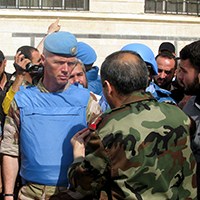Only a diehard optimist would argue that there will be a sustainable cease-fire in Syria by the end of this year. While Russia and the Western powers are still bickering over the precise terms for the destruction of the Syrian regime’s chemical weapons, brutal fighting persists on the ground. The army and rebels continued to clash last week, and the rebels have also been battling one another, with radical Islamist and more-moderate factions struggling over the northern town of Azaz. This sort of fratricidal combat reinforces the fear, previously voiced by United Nations officials, that Syria could fragment into another Somalia.
Yet there has been talk of a cease-fire too. Syrian Deputy Prime Minister Qadri Jamil admitted last week that the government cannot win the war outright, holding out the prospect that the regime of President Bashar al-Assad would call for an end to hostilities at long-postponed peace talks in Geneva. With world leaders gathering in New York for the U.N. General Assembly this week, there will probably be a lot of talk about convening the Geneva talks in October. U.N. Secretary-General Ban Ki-moon is especially likely to press the issue.
As I have previously chronicled, Russia and the U.S. first tabled the idea of a peace conference in May, but it has been repeatedly delayed. There is now a slightly improved chance that the Syrian government and at least some rebel leaders will convene in Geneva. They might emerge with a deceptive “agreement” to end the violence, which could in turn result in a new peacekeeping mission in Syria—a sequel to last year’s ill-fated U.N. efforts to supervise a cease-fire agreed to, and broken by, Assad.

